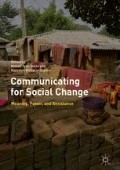Abstract
Dominant communication research that valorizes objectivity in order to prescribe top-down measures of social change removes the researcher from the process and erases voices of the communities. In contrast, I argue that positioning the self in relation to those “studied” enables the communication scholar to foster participatory coconstructive spaces for change. Through a case study, I explore gendered context of the participants and my narratives to illustrate the significance of self-reflexivity for social change. Through narratives of lived experiences of female commercial sex workers and my self-reflexivity, I am able to juxtapose our stories and locate both the “researched” and the “researcher” as active participants in the research process. In doing so, we connect our gendered selves to the broader context within which these stories transpire moving toward a change that is embedded in a coconstructive process. In fact, I argue that self-reflexivity moves us toward social change projects aimed to achieve social justice, that is, projects that reflect a culturally meaningful knowledge that is coconstructed by both the researcher and the researched.
Access this chapter
Tax calculation will be finalised at checkout
Purchases are for personal use only
Notes
- 1.
Red tika (on the forehead), glass bangles, and a string of glass beads around the neck are cultural markers of being married. A sari is a five- to nine-yard length of fabric that drapes around the body, often worn daily by married women. Although kurta, a long, loose-fitting, knee-length top with a matching pant bottom, is also regularly worn by unmarried as well as by more and more married women. A kurti is a short top without the matching bottom.
References
Basnyat, I. (2017). Theorizing the Relationship between Gender and Health through a Case Study of Nepalese Street-Based Female Sex Workers. Communication Theory. doi:https://doi.org/10.1111/comt.12114
Beattie, T. S., Mohan, H. L., Bhattacharjee, P., Chandrasekar, S., Isac, S., Wheeler, T., … Watts, C. (2014). Community mobilization and empowerment of female sex workers in Karnataka State, South India: Associations with HIV and sexually transmitted infection risk. American Journal of Public Health, 104(8), 1516–1525. doi:https://doi.org/10.2105/AJPH.2014.301911.
Bishop, E., & Shepherd, M. (2011). Ethical Reflections: Examining Reflexivity through the Narrative Paradigm. Qualitative Health Research, 21(9): 1283–1294.
Bott, E. (2010). Favourites and others: reflexivity and the shaping of subjectivities and data in qualitative research. Qualitative Research, 10 (2): 159–173.
Charmaz, K. (2000). Grounded Theory in the 21st Century: Applications for Advancing Social Justice Studies. In N.K. Denzin & Y.S. Lincoln (Eds.), The Sage Handbook of Qualitative Research (pp. 507–536). Thousand Oaks, CA: Sage Publications.
Chase, S.E. (2008). Narrative Inquiry: Multiple Lenses, Approaches, Voices. In N.K. Denzin & Y.S. Lincoln (Eds.), Collecting and Interpreting Qualitative Materials (pp. 57–94). Thousand Oaks, CA: Sage Publications.
Colombo, M. (2003). Reflexivity and Narratives in Action Research: A Discursive Approach. Forum: Qualitative Social Research, 4, retrieved from: http://www.qualitative-research.net/index.php/fqs/article/view/718
Daya, S., & Lau, L. (2007). Introduction: Power and Narrative. Narrative Inquiry, 17, 1–11.
De Fina, A. (2009). Narratives in interview – The case of account. For an interactional approach to narrative genres. Narrative Inquiry, 19 (2): 233–258.
Dutta-Bergman, M. (2004). The unheard voices of Santalis: Communicating about health from the margins of India. Communication Theory, 14, 237–263.
Dutta, M.J. (2010). The Critical Cultural Turn in Health Communication: Reflexivity, Solidarity, and Praxis, Health Communication, 25, 534–539.
Kerrigan, D., Moreno, L., Rosario, S., Gomez, B., Jerez, H., Barrington, C., … Sweat, M. (2006). Environmental-structural interventions to reduce HIV/STI risk among female sex workers in the Dominican Republic. American Journal of Public Health, 96(1), 120–125. doi:https://doi.org/10.2105/ajph.2004.042200.
Malterud, K. (2001). Qualitative research: standards, challenges and guidelines. The Lancet, 358, 483–488.
Nagata, A. L. (2004). Promoting self-reflexivity in intercultural education. Journal of Intercultural Communication, 8, 139–167.
Lie, R., & Servaes, J. (2015). Disciplines in the field of communication for development and social change. Communication Theory, 25(2), 244–258.
Waisbord, S. (2014). The strategic politics of participatory communication: Where strategic communication and communication for social change (should) meet. In R. Obregon, T. Tufte & K. Wilkins (Eds.), Handbook of development communication and social change. Malden, MA: Wiley.
Waisbord, S. (2015). Three challenges for communication and global social change. Communication Theory, 25(2), 144–165.
Author information
Authors and Affiliations
Editor information
Editors and Affiliations
Rights and permissions
Copyright information
© 2019 The Author(s)
About this chapter
Cite this chapter
Basnyat, I. (2019). Self-Reflexivity for Social Change: The Researcher, I, and the Researched, Female Street-Based Commercial Sex Workers,’ Gendered Contexts. In: Dutta, M.J., Zapata, D.B. (eds) Communicating for Social Change. Palgrave Macmillan, Singapore. https://doi.org/10.1007/978-981-13-2005-7_2
Download citation
DOI: https://doi.org/10.1007/978-981-13-2005-7_2
Published:
Publisher Name: Palgrave Macmillan, Singapore
Print ISBN: 978-981-13-2004-0
Online ISBN: 978-981-13-2005-7
eBook Packages: Social SciencesSocial Sciences (R0)

